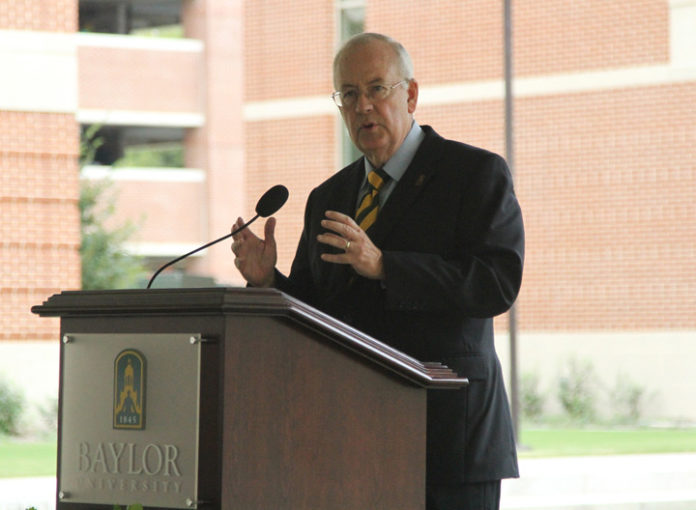
By Vivian Roach | Staff Writer
Ken Starr, former Baylor president, has been introduced to President Donald Trump’s legal team ahead of the Senate trial, which opened Tuesday morning, and continued debate late into the night.
Starr served Baylor for 6 years, and was a professor of law at Pepperdine University.
Starr was last seen on Capitol Hill in 1999, when he investigated president Bill Clinton during his impeachment trial. Starr left Baylor in 2016 and was a Fox News contributor before joining the president’s legal team.
Baylor alum Peter Mungiguerra worked at the State Legislature with Rep. Terry Meza after graduating early as a University Scholar. He is now the executive director of the McLennan County Democratic Party.
“Interesting to see [Starr] step into a role where he is trying to protect a president from the allegations made against him, and covering up crimes of this president,” Mungiguerra said. “But comfortable trying to uncover another president’s sexual misbehavior.”
Senate Majority Leader Mitch McConnell first proposed that any decision regarding witnesses be done at a later point. A vote can be taken at any time to allow the Senate to debate privately without cameras or non-Senate members. These two rules were also in play during the Clinton trial.
McConnell called for two days of opening arguments and a maximum of 24 hours of talking from each side.
Shortly before the impeachment trial opened on Tuesday, edits were added to McConnell’s proposed rules. There was strong opposition to McConnell’s proposal from both Republican and Democratic senators, who called for an extra day to be added for opening arguments.
Moderate senators opposed two days of opening arguments, arguing the hearings would be going late into the night if each side took their allotted 24 hours. Additionally, the House is allowed evidence from its impeachment hearings, and calling new witnesses is still in debate.
Pat Flavin, associate professor of political science at Baylor said the most important vote is to decide if new witnesses will be allowed.
“The vote is very unlikely, but it is possible that four Republican senators will vote to bring in new witnesses to allow new evidence to be introduced,” Flavin said. “I think that it is more unlikely than likely, it seems like the public would like to see new witnesses, with John Bolton coming forward we will see what happens.”
Now, with the extra day for opening arguments, the impeachment is expected to end by Feb. 4, running six days a week. Trump’s State of the Union speech will also occur on Feb. 4.
It isn’t the first time this would occur – President Clinton also gave his State of the Union speech in the midst of his own impeachment trial. However, Trump is running for reelection, unlike Clinton.
The Associated Press contributed to this report.





